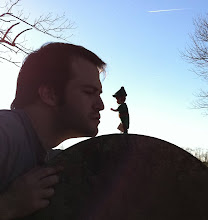When I started Writing is Tricky I never considered that it would be anything more than my writings (or snippets thereof), rants, writing tips, and nifty little bits of our universe from travel and biology to Dai Vernon and to all things tricky. But one pleasant surprise of starting this blog is that I find more and more often my posts turn into a celebration of the writers I know and love, whom I consider some of my closest friends
—no scratch that
—closest family members, not of blood but of passion for writing. I will continue to post the mishmash of other topics, but I find that this year has been a particularly great year for those said writers, and today is no exception.
—no scratch that
—closest family members, not of blood but of passion for writing. I will continue to post the mishmash of other topics, but I find that this year has been a particularly great year for those said writers, and today is no exception.
And what better day than Valentine's Day to have All this Talk of Love about Chris Castellani's newest novel.
Last week I was fortunate enough to attend the book launch and first reading of Chris Castellani’s third novel All this Talk of Love (ATToL) at Porter Square Books in Cambridge. ATToL is a trilogy, unlike any other that I have read, chronicling the lives of an Italian family, the Grasso family, from its ancestral home in Italy just prior to World-War II, its emigration from Italy to the Untied States, and finally, in present day coming full-circle...an unlikely family vacation back to Italy.
The reading itself was a full house, over 150 in attendance--standing room only folks--and wow, hearing Chris read, it was well worth the cramped quarters.
Fans waited patiently for 2+ hours to have their copy
of ATToL signed
|
Chris' writing style is sharp, polished, and forms a hypnotic cadence that quickly allowed the audience to fall into the world of the Grasso family-- their ambitions, hopes, and fears.
It was laugh out loud funny yet formed gooseflesh in its poignancy.
And at the heart of all this?
What it means to be family.
The reading was, in a word this writer-and-magician does not often use--spellbinding. I've seen few readings draw in an audience as wholly as ATToL.
"It's like living with a feral animal" Chris describing what
it must be like to be the spouse of a writer
|
You should definitely check Chris out (Check the links below. He may even be coming to a town near you!)
Some of Chris' fan base, including yours truly.
Can you spot him?
|
Christopher Castellani is the son of Italian immigrants and a native of Wilmington, Delaware. He resides in Boston, where he is the artistic director of Grub Street, one of the country's leading non-profit creative writing centers. He is the author of two previous critically-acclaimed novels, A Kiss from Maddalena (Algonquin Books, 2003)—winner of the Massachusetts Book Award in 2004—and The Saint of Lost Things (Algonquin Books, 2005), a BookSense (IndieBound) Notable Book that was long-listed for the IMPAC Dublin Literary Award in 2006.
In addition to his work with Grub Street, Christopher is on the faculty of the Warren Wilson MFA program and the Bread Loaf Writers Conference. Christopher was educated at Swarthmore College, received his Masters in English Literature from Tufts University and a Master of Fine Arts in Creative Writing from Boston University.




